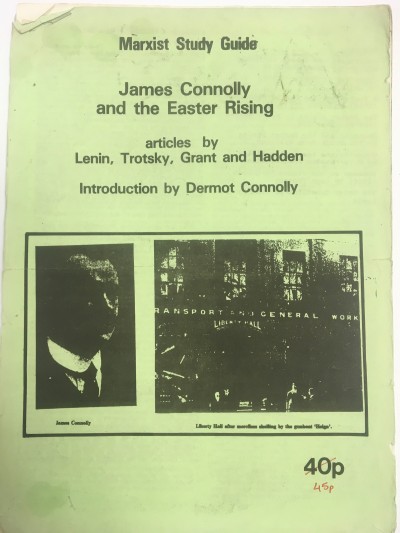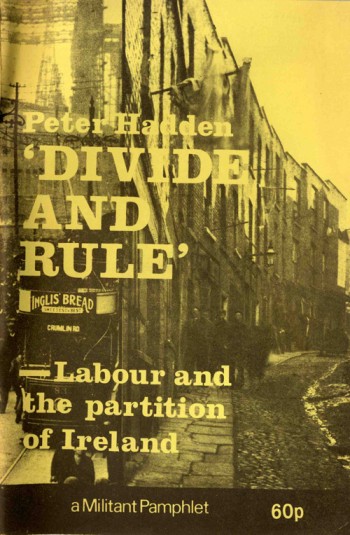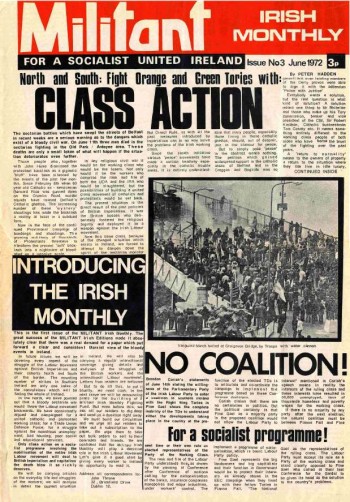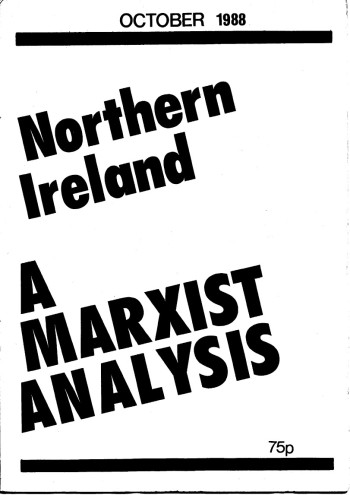Marxist Study Guide: James Connolly and the Easter Rising

| Date: | 1987 |
|---|---|
| Organisation: | Militant |
Contributors:
Info | Dermot Connolly, Ted Grant, Peter Hadden |
| View: | View Document |
| Discuss: | Comments on this document |
| Subjects: | James Connolly |
Please note: The Irish Left Archive is provided as a non-commercial historical resource, open to all, and has reproduced this document as an accessible digital reference. Copyright remains with its original authors. If used on other sites, we would appreciate a link back and reference to The Irish Left Archive, in addition to the original creators. For re-publication, commercial, or other uses, please contact the original owners. If documents provided to The Irish Left Archive have been created for or added to other online archives, please inform us so sources can be credited.
Commentary From The Cedar Lounge Revolution
6th September 2021
Many thanks to the person who forwarded this to the Archive.
This is an useful addition to the Archive, dating from 1987, a Marxist Study Guide, issued under the broad Irish Militant umbrella with an introduction written by Dermot Connolly on James Connolly, articles by Lenin on ‘Class War in Dublin (1913)’ and ‘A Week after the Dublin Massacre (1916)’, ‘The Easter Rising’ by Peter Hadden, ‘Connolly and the Easter Rising’ by Ted Grant, ‘Connolly and the Easter Rising by Peter Hadden, ‘Lessons of the events in Dublin (1916)’ by Trotsky and ‘The Irish Rebellion of 1916’ by Lenin.
The Introduction is of particular interest, arguing that ‘The Protestant working class will never accept a capitalist United Ireland. On the other hand the Catholic population have never, and will never, accept the sectarian state in the north. There is no solution within the confines of capitalism’. And ‘Left leaders like Tony Benn in Britain could do well to study the writings of James Connolly. To simply argue for a united Ireland is to adopt a non-class position in the real concrete conditions which exist.’
And the article suggests that ‘There is only one demand, which if taken up and campaigned for by the labour movement throughout these islands, can pose a solution – for a socialist United Ireland, linked to a socialist Britain, in a socialist federation of Britain and Ireland’.
Noteworthy are the questions for discussion on the last page which include the following:
Haven’t the workers in Ireland always been divided by religion?
If Ireland was an important colony, why did the Liberal Government of the day propose ‘home rule’ for Ireland in 1913?
Didn’t the 1916 Proclamation show that Connolly accepted that the national liberation struggle came before the struggle for socialism?




Comments
No Comments yet.
Add a Comment
Comments can be formatted in Markdown format . Use the toolbar to apply the correct syntax to your comment. The basic formats are:
**Bold text**
Bold text
_Italic text_
Italic text
[A link](http://www.example.com)
A link
You can join this discussion on The Cedar Lounge Revolution
By: pettyburgess Tue, 07 Sep 2021 11:12:01
In reply to Liberius.
It’s quite unusual to see the old Militant federation line implicitly criticised for giving too much ground to Irish particularism or Irish nationalism. That’s the logic of Luxemburg’s argument if applied in this context, that a socialist future depends on a strong, centralised British state without independence or semi independence for oppressed nationalities.
A chapter of Lenin’s pamphlet on the right of nations to self determination criticised Luxemburg on exactly this issue, the consequences of this view of the national question if applied to Ireland (“The Utopian Karl Marx and the Practical Rosa Luxemburg”).
Reply on the CLR
By: EWI Tue, 07 Sep 2021 11:17:57
In reply to pettyburgess.
that a socialist future depends on a strong, centralised British state without independence or semi independence for oppressed nationalities.
Funny how so much of this, i.e. coming from English or Russian ‘comrades’, just happens to neatly align with their respective nationalisms.
Reply on the CLR
By: EWI Tue, 07 Sep 2021 11:22:39
In reply to WorldbyStorm.
If we were at the point of socialist federations being a tangible reality we likely would have moved past them as a position to global communism/anarcho-communism/post-scarcity.
We’ve definitely receded from the desired sci-fi utopia in the past twenty-five years, not least with the victory of the neolibs.
Reply on the CLR
By: roddy Tue, 07 Sep 2021 11:25:26
In reply to EWI.
This federation would have to be founded as a result of free and fair elections.Problem is a future electorate could reject socialism,install a right wing British government which would reverse all previous gains but opt to keep the “federation” with a subugated Ireland therein.
Reply on the CLR
By: pettyburgess Tue, 07 Sep 2021 11:47:01
In reply to EWI.
Yes, that was one of the points that particularly exercised Lenin in these debates, the propensity of socialists in great powers to discover forms of “internationalism” that paralleled the nationalisms of their own state.
Luxemburg and her SKDPiL seem to have particularly aggravated him because they were Polish socialists opposed to Polish self-determination rather than Russian or German chauvinists. They were doubly annoying because not only were they wrong, they gave licence to Russians and Germans to be wrong.
A weird and understudied party, by the way. It was the political background of quite a number of significant figures in both Russian and German socialist history but was relatively marginal in Poland.
While Luxemburg is often counterposed to Lenin on questions of party organisation as a more libertarian alternative, based on various polemics she produced, the actual history of the SKDPiL does not at all back that up. It was a much more autocratic organisation than the Bolsheviks.
Reply on the CLR
By: pettyburgess Tue, 07 Sep 2021 12:12:31
In reply to banjoagbeanjoe.
Militant Left call for “a Socialist Ireland, without coercion, in a free and voluntary federation with a socialist Scotland, a socialist England, a socialist Wales and a socialist Europe”
The Socialist Party’s current formulation is something similar. Neither say Britain any more because they support Scottish independence in the same federal context.
There are small differences of emphasis. Both are actually a bit less nationalist than Militant was when this pamphlet was produced. Militant were still presenting their approach as the way to achieve a united Ireland back in 1986. Neither group argues in that way today and both focus much more on the right of Protestants not to be “coerced”.
It’s generally a weird pamphlet. The Lenin material doesn’t really fit with the Militant material. The short Trotsky piece wasn’t in keeping with his later views and has a real air of someone waffling on the basis of a superficial knowledge and some general principles.
Reply on the CLR
By: Liberius Tue, 07 Sep 2021 13:59:38
In reply to pettyburgess.
I’ve made a point here before many moons ago that I don’t think it was beneficial to the working class, particularly here in Ireland, for fissures to be opened up on both a North-South and East-West axis, so yes in the context of the early-to-mid 20th century I think it would have been the correct view to see a socialist future here as being more likely to emerge out of a centralist United Kingdom as from atomised nation-states. In the context of the 21st century I’m of the view, looking at the last decade, that centralisation of the EU is now inevitable, it might have lumps and bumps but it is the direction European capital is moving in. Ultimately to me that means that a centralist Europe has now replaced the United Kingdom as the most plausible vehicle of achieving sustainable non-autarkic socialism in Ireland, certainly much more so than a nation-state. Whether archipelagic federalism has a place in the long-term future though is less clear, I think it might be a wholly redundant concept at this stage.
Reply on the CLR